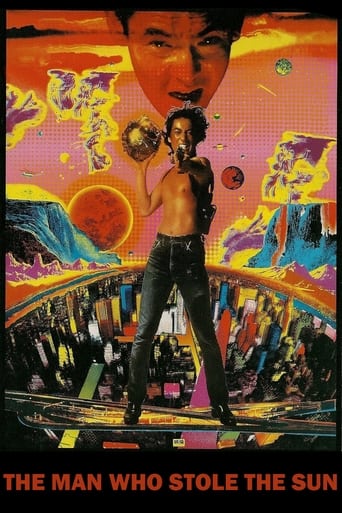rjobrien_1943
I watched the Hong Kong DVD release of this film - still available, I believe - which offers reasonable quality, though the Japanese characters have been given Chinese names and the English subtitles are sometimes poor. I thought the first half of the film was intriguing, outlandish, imaginative and weirdly funny. The introduction of a rather irritating DJ character added little to the movie, other than an obligatory romantic interest for the anti-hero. As other reviewers have pointed out, the film goes on too long, offering a succession of action set-pieces that seem at odds with earlier scenes. The main character's motivations remain a mystery and the downbeat ending falls a little flat, given the subject matter. For all these faults, I'd give it another look, but what could have been a great movie slipped away somehow.
angelosnow
The Man Who Stole The Sun "Taiyo o nusunda otoko" (1979) The Man Who Stole the Sun is a title which invokes the myth of Prometheus, who stole fire from the Gods to give to man and was duly punished for it. The film revolves around a science teacher, Makato Kido (Kenji Sawada) who steals the secrets of the atom, constructing his own atomic bomb from stolen plutonium and holding Tokyo to ransom.Kido, the long haired, bubble gum chewing teacher who smokes too much and sleeps in class, goes by the terrorist codename "Nine". A symbolic reference to the eight nations who possess nuclear weapons (America, Soviet Union, England, France, China, India, Israel, South Africa), thus making him, potential nuclear threat number nine. Kido's flawed portrayal is as a man who desires the knowledge and power of an atomic bomb, yet upon attaining it, he is at a loss on what do with it. Subsequently, he calls up the vacuous, pretty radio hostess "Zero" (Kimiko Ikegami) and asks what others would demand if they had a nuclear bomb. The demand: that Rolling Stones would perform in Tokyo.The Rolling Stones is just one reference which contextually marks this late 1970s film. The other themes of the film: the Vietnam and Cold War, nuclear proliferation and the power of nations over the individual, reflects a social context where the autonomy of the individual was second to government agendas. By giving nuclear power to Kido, the film espouses a very liberal agenda of an individual (or public opinion) being able to assert his will on the government.Yet, as with many Japanese films, the fascination of the bomb – its raw destructive potential as well as its slow decaying effects – is a constant reminder of what the dangers of such power, placed in the wrong hands, can do. But who can blame them, being the only nation to experience the devastating effects of the atomic bomb? (Apart from South Australia of course, but according to the government, Aborigines don't count). "Prolonged exposure to radiation leads to hair loss, tissue decay and eventual death" Zero tells us. The death of Kido's cat through plutonium poisoning, hair falling out, bleeding gums, nausea, vomiting and finally culminating in Zero's ironic death as an indirect result of the bomb are constant reminders of this.Cinematically, Tokyo is captured beautifully through filters, portrayed as an almost surreal, blue urban landscape which infests the very streets, office hallways and the panoramic locations. The scenes in which Kido steals the plutonium is one of the highlights, reminiscent of the stills sequence of Chris Marker's La Jetée. Iran and South Korea could even take a few pointers from Kido's plutonium enrichment techniques – heating by home stove-oven.However, the film falls flat in the last half hour. The director had three chances to resolve the ending, but he forgoes all three. As a result, the film seems to protract itself needlessly. The last few minutes turns almost into a mockery of what the director had worked to build in the first one and a half hours, degenerating into a clichéd Hong Kong-esquire action/comedy car-chase and final violent showdown. It also shatters the audience's presumptions about Kido's character, as he desperately attempts to hold onto the bomb which he has no real use for.The film finally ends the only way it could be ended at this point – with Kido strolling down the street, atom bomb at his side. Like the bubble gum Kido seems to blow continuously, the atomic bomb (and the story) is finally stretched beyond its natural limits, leaving it with only one thing left to do: burst.
bear-48
Kazuhiko Hasegawa is a great film director.Though I have been an enthusiastic fan of Kazuhiko Hasegawa's, in the beginning I've had no connection with him, and moreover, I am an ordinary office worker. One day I heard a sad news, "Kubrick is dead", which made me decide to establish Kazuhiko-Hasegawa's website. That's because I believe it is only Hasegawa that can make films like Kubrick's works. After a while, I got a connection with him through the cyberspace, and exchanged opinions each other with e-mails, which we called "e-sessions". One day I suddenly received his phone call. He just said to me, "I want to begin my project on your site"........ Thus I have built up the website to let people submit their scenarios for his new film.


